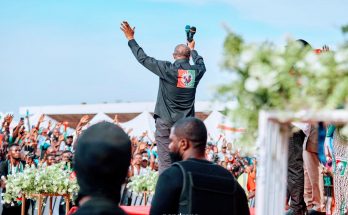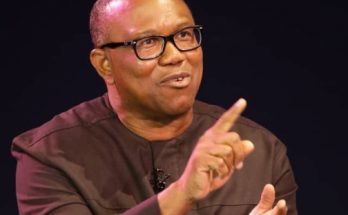It is important that religious leaders are held accountable for their actions and that their followers are educated on their rights and the dangers of blind faith.
By Fada Emmanuel Uchechukwugeme Ogbu.
Religion is a concept intended to inspire and promote love, compassion, and tolerance for those who practice it, regardless of their social status. However, the ideology that gave rise to religion seems to be deteriorating in Nigerian society, where some religious leaders are more concerned with greed and power and expose their followers to deceit and deception. Religion itself is a set of beliefs, practices, and values that revolve around the worship of a higher power or supernatural force. It is characterized by a set of established rituals, codes of conduct, and doctrines that guide the moral and ethical behaviour of its adherents. From another perspective, it serves as a source of comfort, guidance, and community for its followers, providing a framework for understanding the meaning and purpose of life. Why then is the concept of religion in Nigeria a very different one?
The Nigerian Religious Landscape.
Nigeria has a diverse religious landscape that reflects its complex histories of colonization, international commerce, and internal migration patterns. Christianity and Islam are the two most prominent religions in the country, with a significant number of Nigerians also practicing traditional African religions. Christianity is the largest religion in Nigeria, with the majority of Christians belonging to the Catholic Church and various other denominations. Islam is the second-largest religion, with adherents mainly concentrated in the northern part of the country. Traditional African religions remain prevalent in rural areas, with many communities combining elements of African traditions with Christianity or Islam.
Thus, religion plays a significant role in Nigerian society, with religious leaders wielding considerable influence over social, political, and economic affairs. Many churches and mosques provide vital social services like healthcare, education, and welfare services, particularly in communities with limited access to government-funded services (though not to the total benefit of their congregants). Religious organizations also play a role in facilitating peace building initiatives and conflict resolution efforts, with many religious leaders serving as mediators between warring factions in different parts of the country and beyond.
In recent years, Pentecostalism has experienced significant growth in Nigeria, with millions of Nigerians embracing this charismatic movement with their promises of personal salvation, faith healing, and prosperity theology. They are also known for their elaborate worship services, prayer sessions, and prophetic ministries. The proliferation of Pentecostalism has also led to concerns about financial exploitation, religious fundamentalism, and corruption within the religious sector.
The Deception of/by Religious Clerics.
Unfortunately, the Nigerian religious landscape has been marred by instances of corruption, greed, and exploitation, with some religious leaders engaging in fraudulent activities. Many religious leaders have been accused of using their positions for personal gain, building empires through tithes, offerings, and seed sowing. These practices often exploit impoverished congregants who have limited economic resources, with the promise of spiritual blessings and prosperity.
Some religious leaders have also been caught engaging in fraudulent activities, such as money laundering and outright fraud. In some cases, these leaders have taken advantage of their followers’ trust to deceive them into giving money or assets, often with the promise of miraculous healing, breakthroughs, or spiritual deliverance. Also, many popular religious clerics have been accused of rape, extramarital affairs, money laundering and illicit fundraising practices by their congregant, thereby taking advantage of their positions to abuse women and their congregants.
The deceptive disposition of so called clerics or religious leaders, highlights the need for increased accountability measures in the religious sector. There is a need for religious leaders to prioritize the spiritual and physical well-being of their followers rather than engaging in exploitative and deceptive practices. It is important that religious leaders are held accountable for their actions and that their followers are educated on their rights and the dangers of blind faith.
The Influence of Elites and Politicians.
The influence of elites and politicians in Nigerian religion cannot be overstated. Politicians have often used religion as a tool to gain political advantage and maintain power. They have weaponised poverty to their advantage and to keep the people in a situation of always looking for them. During election campaigns, politicians routinely court religious leaders and promise to promote the interests of their followers in exchange for their support. This has often resulted in religious leaders being used as pawns in political games, leading to a corruption of religious values.
Moreover, the political class and business elite in Nigeria are known for their extravagant lifestyles and notorious acts of corruption. Despite their immoral behaviours, many still attempt to portray themselves as religious and pious, exploiting the vulnerability of the masses. Religion has been trivialized and the love of money have led religious leaders to selling Jesus in discount. This hypocritical behaviour causes disillusionment among the masses, who often view these elites as insincere and undeserving of their support. But the masses seem to be totally helpless – religious hijack.
The Brainwashing Effect.
The brainwashing effect is a significant challenge in Nigerian religious practices. Some religious leaders have been known to manipulate their members by distorting religious doctrines to suit their personal interests. They often use these distortions to exert control over their members, leading to the suppression of individual thought and critical reasoning. This type of control leaves members open to manipulation and exploitation by the religious leaders.
Fear-mongering is another tactic used by some religious leaders to maintain control over their members. They often use threats of eternal damnation, punishment, and excommunication to compel members to comply with their expectations. Such tactics can be psychologically damaging to members who are then unable to critically evaluate religious doctrines and are held in religious bondage. Members subjected to brainwashing are often in a state of paranoia, anxiety, and emotional distress.
The combination of emotional manipulation and fear-mongering tactics used by some religious leaders (especially Muslim clerics) can lead to depression, anxiety, and even post-traumatic stress disorder. Sleep is a natural state of rest for the body and mind, essential for physical and mental wellbeing. Adults need 7-9 hours of sleep per night for optimal health. But these acclaimed ministers will consciously deny people the opportunity to sleep at night with their so-called Church activities. These people will go from such prayer centers to their workplaces or business areas during the day, struggling with sleep.
The ripple effects are – high blood pressure, accidents, psychological imbalance and brain decay in general. Meanwhile, the so-called ‘men of God’ themselves can afford the use of supplements, dietitians and even better hospital attention with the tithes paid by the congregants in the name of God. Deception! That boils down to what Jesus said in Matthew 23:4, “They tie up heavy burdens and lay them on men’s shoulders, but will they lift a finger to move them? Not they! Everything they do is done to attract attention”. I believe that the promotion of compassion and love within religious practices and communities can help shift the focus from deception, manipulation and fear-mongering to spiritual growth and personal development.
The Implications of a Religion Without Humanity.
A religion without humanity can have significant negative implications for society. A religion that lacks humanity is preoccupied with rigid religious teachings and dogma, often ignoring fundamental human values of love, compassion, empathy, and respect. This kind of religion can promote intolerance, division, hinder economic progress, and exploit vulnerable individuals in society. One major implication of such a religion is the exploitation of vulnerable members of society.
This can occur when religious authorities use their power to manipulate followers into providing material or financial support, which can often lead to financial or spiritual drains. In addition, religious leaders can pressure vulnerable members into submission, sometimes leading to psychological, emotional, and even physical abuses. However, the major implication of religion without humanity for me is the promotion of intolerance and division within society. Religious differences in these kinds of religions often lead to conflicts born out of disagreements in doctrines or beliefs.
Members of these kinds of religions may be intolerant of differences with other groups, leading to conflicts that can be violent or destabilizing to society. Such a religion can hinder social and economic progress. Religious practices that focus solely on supernatural or otherworldly concerns and ignore material issues may discourage individuals from pursuing economic, social, or political advancement. This, in turn, can hinder the growth of a society, leading to poverty, insecurity, inequalities, and other social issues that retard progress.
Why we are still so blind and blunt about the effect of extremism in religious activities is one of the things that gives me concern. God cannot come down to improve on the world he created and handed over to us. He gave us the mandate to subdue, conquer and rule the earth, that is, make it a better place, but we are still being deceived by our religious and political leaders into waiting for ‘manna from heaven’. Who made the West and other parts of the world what they are? God or Man? But everybody wants to run to those places without holding those who kept us where we are responsible.
A religion without humanity can have far-reaching negative implications for society. We must adhere to fundamental human values.
Recommendations.
In conclusion, it is evident that religion has tremendous influence over people’s day-to-day activities in Nigeria. However, it is also evident that the current practice of religion in Nigeria lacks humanity, compassion, and inclusiveness. Religious leaders and followers in Nigeria need to understand that the survival of Nigeria may depend on the advancement of shared values rather than solely on doctrinal differences. Nigeria can foster religious unity by embracing a more compassionate and inclusive religious perspective. Religious institutions must promote values such as empathy, respect, and acceptance.
Nigerians must recognize that it is possible to have strong religious beliefs and still work towards common social and economic goals. Religious leaders and followers must reject intolerance and encourage religious harmony through interfaith dialogues, mutual respect, and understanding. If there will be a religious reform in Nigeria, it must focus on the promotion of human values instead of doctrinal differences. The government should create a forum for religious leaders and followers to discuss and deliberate on issues affecting the country’s religious landscape, economic, and social spheres.
Also, the government should encourage interfaith dialogues, promote a shared vision, and foster collaboration among different religious groups. Religious leaders should stop taking advantage of their followers by overusing them to maximize their selfish gain. In Germany for instance, the Church is the highest employer of labour but they pay their employees according to what is stated by the law unlike what we see in Nigeria.
What we need is religious reform, not a religious divide. We must recognize that religious differences do not have to translate into animosity, conflict, and division. Instead, we can foster religious unity through compassion, understanding, tolerance, open-mindedness, and the promotion of a shared vision of economic and social progress. Only then can Nigeria achieve a more humane, equitable, and inclusive religious landscape.





This is amazing, good job. Keep it up and one day our world will be good again. Nice job!